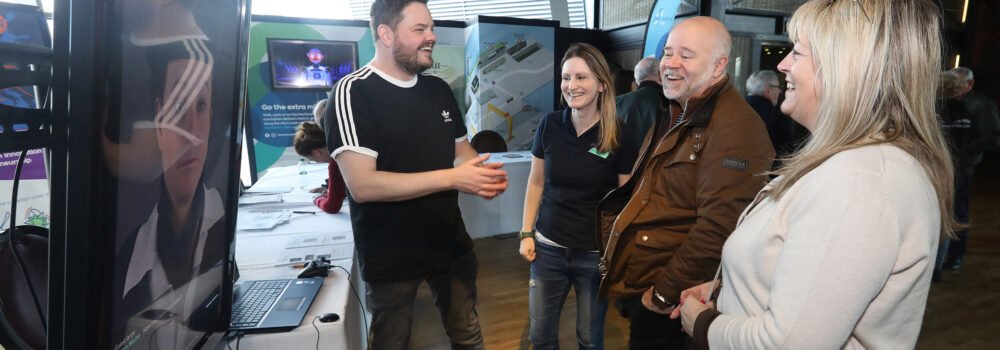Published: 9th April 2024
New immersive visitor experiences showcase Belfast Maritime Mile’s heritage
Visitors and local people can experience Belfast Maritime Mile’s heritage in brand new ways for free this week as part of the Belfast HUB-IN project.
Six local creative and digital businesses, artists, and innovators were awarded £120,000 from Belfast City Council to collaborate with heritage organisations and communities and develop innovative prototype visitor experiences to animate and enrich the city’s iconic Waterfront.
Three of these experimental projects will be showcased this week and people can try out a range of experiences powered by artificial intelligence, augmented reality, and virtual reality.
Chair of Belfast City Council’s Strategic Policy and Resources Committee, Councillor Christina Black said: “HUB-IN is helping to nurture exciting new relationships between Belfast’s heritage and creative industries sectors, communities, and businesses along the Maritime Mile, and supporting people to develop valuable entrepreneurial and digital innovation skills. It’s fantastic to see these proposals come to life along the Maritime Mile.”
Kerrie Sweeney, Chief Executive of Maritime Belfast Trust added: “Maritime Belfast Trust is committed to delivering an iconic waterfront for Belfast. This project is where heritage and innovation collide – an outdoor Heritage Lab of unexpected surprises! It’s fantastic to see young creatives working with some of our oldest communities on innovative technologies, such as Artificial Intelligence and Augmented Reality, to provide new ways to explore our rich maritime heritage and stories along Belfast’s Maritime Mile. This is only the start of a pilot initiative, and we are looking forward to building on its success in the future.
Tomorrow, Wednesday April 10, between 12pm-3pm at the Linen Lounge, Belfast Metropolitan College, Titanic Campus, visitors can try out ‘Maritime Echoes: An AI Voyage to the Past’ developed by local innovator Darin Smyth. Using the power of AI and Unreal Engine 3D software, pivotal historical figures from Belfast’s rich maritime past, including Mary-Ann McCracken, Lord Pirrie and William Ritchie will be brought to life.
On the same day, between 1.30pm – 4pm at the Dock Café, Titanic Quarter, visitors will get an exclusive preview of interactive 3D virtual reality rooms developed by Flax & Teal in partnership with the Public Records Office of Northern Ireland (PRONI). The virtual reality experience will give people a unique perspective on the Belfast waterfront area’s evolution by showcasing the stories of past generations through images, video, audio, and historic maps.
And this weekend, 5.30pm – 8pm on Friday April 12 and 12noon – 4pm on Saturday April 13, visitors can call into St Joseph’s Church, 9 Princes Dock Street, Sailortown to discover ‘Memory Anchors’ – a collaboration between digital artist Katya Solomatina and the Sailortown Regeneration Group which aims to preserve the heritage and local stories of Sailortown through interactive digital sculpture and storytelling. Visitors can see virtual art pieces developed using augmented reality and listen to stories created by the Sailortown community.
A new Treasure Hunt Quest will also run from April 13 to August 31 2024. Starting on Donegall Quay, visitors can use their mobile phone to follow the route towards Sailortown and discover hidden virtual objects created by the Sailortown community.
The projects are supported by the Belfast HUB-IN (Hub of Innovation) programme, developed by Belfast City Council’s City Innovation Office in partnership with the Maritime Belfast Trust, to explore how digital innovation can help to sustain, enhance, and preserve the Maritime Mile’s rich and unique heritage.
Visit www.belfastcity.gov.uk/XRbelfast and www.smartbelfast.city
for more information. For details on things to do and see across the Maritime Mile this week and beyond, visit www.maritime-mile.com
The Belfast HUB-IN project is part of a €7.9 million European initiative that aims to transform historic urban areas through innovation and spread public benefits from urban regeneration. It’s funded by the European Union’s Horizon 2020 research and innovation programme under grant agreement No. 869429.
